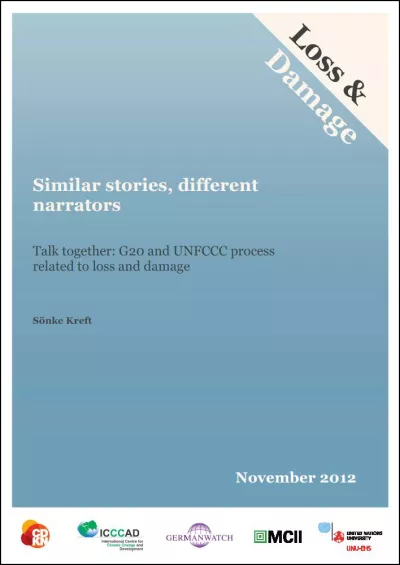Similar stories, different narrators

Introduction: disaster risk management, loss and damage
Natural catastrophes, many of which are directly or indirectly expedited by climate change, take a heavy toll on people and economies. In 2011 a record high in economic damage was reached, with an estimated loss of more than US$350 billion.
The human toll is uniformly dire: the drought-induced famine in the Horn of Africa claimed tens of thousands of victims, with lasting impacts on millions of people well into 2012. While lower-income countries bear the brunt of the human impact of disasters, middle-income countries experience the greatest economic impact relative to their capacities. Catastrophes have become de facto government liabilities, legally and morally, with detrimental effects on national budgets. They have also become the focus of the international community, which increasingly spends money for humanitarian rather than development purposes.
Whereas the financial and economic crisis of developed countries dominated the headlines (and tied up most of the political attention and capital) in 2012, there is no doubt that risks of natural disasters increasingly worsen the chances of achieving sustainable development objectives in many countries and are a threat to their long-term fiscal stability. As a point in case, the credit rating of many countries is already affected by their exposure and vulnerability to climate and hydrological shocks.
The recent SREX report (2012) highlights the factors that have led to the rising number of natural disasters, and points out the deficits in addressing underlying risk drivers and increased human activities in high-risk areas. The SREX report also shows that climate change will have significant impacts on the severity and magnitude of climate extremes in the future; it is already doing so, though the impacts differ among regions. What is certain, however, is that as climate change becomes more dramatic, its effect on a range of climate extremes will become a determining driver of loss and damage.
The two policy processes
Two policy processes are relevant to the issue of loss and damage. The first is the G20 under the Mexican presidency in 2012. This deals with the question of disaster risk management and, more specifically, with financial risk management solutions to the repercussions of natural catastrophes – in particular, in high-risk economies. The second is the UNFCCC work programme on loss and damage caused by adverse climate change impacts. The programme was launched at the end of 2010 and should result in recommendations for the 2012 climate summit in Doha.
This paper explores the synergies, overlaps and potential areas of co-operation between these two policy processes.
| Author(s) | Sönke Kreft |
|---|---|
| Publication date | |
| Pages | 8 |
| Document type | Paper
|
